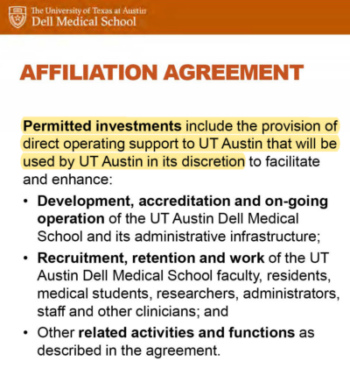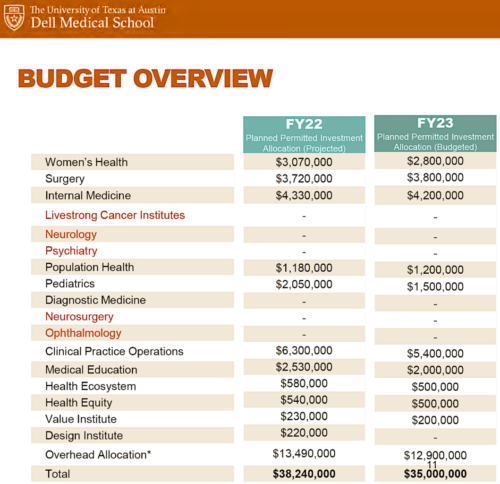Board of Managers can’t get details on healthcare services medical school provides to patients at or below 200 percent of federal poverty level
The Travis County Commissioners Court voted unanimously July 26th to require that Central Health undergo an unprecedented independent performance audit. Commissioners voted again August 2nd to go with the tougher of two proposals for the scope of that audit.
A key goal of the audit is to obtain nitty-gritty details about what medical services Dell Medical School has provided to low-income Travis County residents in return for the $35 million annual payments from Central Health—$280 million so far. Over the initial 25-year term, payments will add up to $875 million and every penny of it comes out of the pockets of Travis County property taxpayers.
By law, Central Health may only use its resources to provide healthcare services for Travis County residents earning no more than 200 percent of the Federal Poverty Level. For a single person that’s $27,180. For a family of four it’s $55,500. If Dell Medical School is using Central Health’s funding for other purposes then it may constitute an unlawful gift of public funds. Which is what The Austin Bulldog’s investigative report documented.
On July 27th the Central Health Board of Managers confronted Dell Medical School’s top managers with exactly the kinds of questions the performance audit should answer: What healthcare services do low-income patients get from Dell Medical School for that torrent of property tax money?
The Board of Managers’ fired off their questions after Dell Medical School’s top executives delivered a 55-minute briefing. Their presentation was carefully scripted to include a 67-page PowerPoint show featuring a long list of medical school accomplishments.


The presentation was delivered by Dell Medical School’s Interim Dean George Macones, MD, who in January was elected president of the American Board of Obstetrics and Gynecology. Also briefing the Board of Managers was Amy Young, MD, vice dean of professional practice for Dell Medical School and chief clinical officer of UT Health Austin, the medical school’s clinical practice.
They no sooner finished than board members started peppering them with questions they were not prepared to answer. If they had read the meeting agenda, they would have seen a “key takeaway” the managers were looking for: “How do UT/DMS expenditures of the $35 million Central Health contribution align with the Central Health mission, and what healthcare benefits/services are provided to the population that we serve pursuant to this spending?”
While Macones and Young could not answer the managers’ questions, they said they would try to do so later—but might not be able to.
In closing the presentation and before taking questions, Macones said, “Thanks for having us today. We do know there will be an audit. We will be willing partners in that. We’re absolutely willing partners.”
Central Health signed away its right to know
The board’s questions were pointed but they were not new—not at all. They were questions the managers have been putting to medical school officials for many years.
What seems never to be discussed in Central Heath Board of Managers public meetings is why Dell Medical School officials never answer questions.
The explanation is simple: They don’t have to.
Central Health forfeited all rights to accountability when it entered into the Affiliation Agreement July 10, 2014. The agreement involves Central Health, its nonprofit subsidiary Community Care Collaborative, and the University. The agreement clearly requires Central Health to make those $35 million annual payments. It requires nothing from the University in return.
The University is quite clear about having no obligations. In its annual operating budgets, the University classifies this money as “nonoperating” revenue, or funding “from state or local governments for which no exchange of goods or services is perceived to have occurred (including) funding for the U.T. Austin Medical School provided by the local healthcare district.” (Emphasis added.)
Outside lawyers drafted the Affiliation Agreement. Lawyers from the Travis County Attorney’s Office, who act as Central Health’s general counsel, presumably reviewed the agreement. The Board of Managers approved the Affiliation Agreement. The senior Central Health official at the time, Executive Vice President Larry Wallace, signed the agreement. All either knew or should have known they were funding startup costs for a new medical school—not funding healthcare services for the poor. The Board of Managers voted to approve the agreement July 2, 2014, according to a statement on Central Health’s website.

Guadalupe Zamora, MD, the only current manager who was on the board when the Affiliation Agreement was approved, told the Bulldog in a telephone interview today, “We told Dell Medical School this money is supposed to go for services. We need services for that money. We need transparency.
“It’s about the patients. We need to get what the patients need. It’s not about what the medical school needs,”’ Zamora said.
Do the Board of Managers understand that under the Affiliation Agreement of July 10, 2014, they have no legal right to get accountability from Dell Medical School? That’s the question the Bulldog asked Central Health.

Ted Burton, the agency’s vice president of communications, responded via email August 5th, as follows:
“As you know Central Health is the defendant in a lawsuit regarding funding of the Dell Medical School, which prevents us from commenting on that case.
“However, Central Health has broad discretion to determine whether funds are being spent in a way that is consistent with its mission of coordinating and delivering medical and hospital care for Travis County residents with low income.
“That is why Central Health board members, at the July 27 public meeting, asked Dell Med leaders for additional detailed data with regards to the specific ways funding is being used.”

That statement appears to fly in the face of information presented to the Board of Managers at that meeting. One of their slides stated the Affiliation Agreement (see screenshot) provides for “Permitted Investments” that will be “used by UT in its discretion (emphasis added) to facilitate and enhance development, accreditation and ongoing operation of UT Austin Dell Medical School and its administrative infrastructure….”
That wording was taken directly from the 49-page Affiliation Agreement. It clearly explains why Dell Medical School is not obligated to do anything for Central Health or its needy healthcare patients.
Pending lawsuit an immediate threat
The Travis County Commissioners Court is working to initiate a third-party independent performance audit, but that effort will take considerable time. They have to finalize the scope of work, issue a request for proposals to find qualified consultants who have no conflict of interest, and select and hire them.
If the originally drafted scope of work is specified in the performance audit contract, then the auditor’s would have 90 days to provide a thorough review of “The number and scope, by aggregate patient encounters, by universal diagnostic codes, universal treatment codes, and other pertinent utilization or other data, in the audit firm(s) discretion, by year of any and all healthcare services as defined in Texas Health and Safety Code, Section 281.028 and .029, provided by DMS (Dell Medical School) to Central Health MAP (Medical Assistance Program) and eligible patients from the $280 million in CH/CCC annual $35 million payments.”
The auditors would have an additional 90 days to complete a long list of additional findings.
All of which is to say that the performance audit will take considerable time to complete—and that’s if Central Health and its affiliated partners—including Dell Medical School, the University of Texas, Ascension Seton, Community Care Collaborative, and CommUnityCare—all decide to cooperate and provide full access to the records the auditors will need. It is entirely possible that one or more of these entities may either refuse to provide access to the necessary records or initiate litigation to prevent it.
Ten lawyers signed a position paper stating the Commissioners Court has the statutory authority to order and oversee an independent third-party performance audit of Central Health. But that advice may not be binding on all parties involved.
For what it’s worth, Interim Dean Macones told the Board of Managers Dell Medical School would be “willing partners” in the audit. But what of the other agencies?
Setting aside the many factors involved in a completing a successful performance audit, the University’s easy access to cash from Central Health’s ATM faces a much more immediate threat from a 2017 lawsuit challenging Central Health’s spending. That lawsuit will likely go to trial this fall. (Birch et al v. Travis County Healthcare District dba Central Health, et al, Cause No. D-1-GN-17-005824.)
Plaintiffs in that litigation argue it is not legal to give $35 million a year to the medical school. A court verdict will likely be delivered long before the performance audit is completed.
Presentation provided missing details
The documents published with our investigation showed that the University’s budget for Fiscal Year 2022 for Dell Medical School included $35 million in income from Central Health. The budget displays 12 line items for medical school expenses totaling $11.5 million. None of those have anything to do with providing healthcare services for indigent patients. Further, there is no indication of what the University intends to do with the other $23.5 million received from Central Health for that budget cycle. The University confirmed that in its response to our public information request.

But wait—details missing in the University’s budget documents were supplied in Dell Medical School’s presentation to the Board of Managers. The Budget Overview slide (see screenshot) shows FY 22 allocations of $38,240,000. Of that amount, $13,490,000—more than 35 percent—is for “overhead allocation” to support “salaries and operating costs of departments such as IT, business support, communications, utilities, etc.”
Of the $19,470,000 allocated for actual healthcare services (women’s health, surgery, internal medicine, pediatrics, and clinical practice operations) there is no indication these healthcare services would be delivered to Travis County’s low-income patients
Questions from Board of Managers

Central Health’s Board Vice Chair, Cynthia Brinson, MD, told the Dell Medical School executives, “We need to account for the $35 million as it pertains to the population we serve. Could you summarize how this furthers the mission of Central Health to provide services for the low-income residents of Travis County?”
Interim Dean Macones replied that most of what was included in the briefing “was to optimize care for the poor. Almost all the clinical care has a significant focus in that area. We are really engaged in care for the poor.”
Brinson said more detail is needed. “How many hours were spent in clinics, in hospitals, so we can get a better idea of where our $35 million is going? You give us large swatches of information but we really need a lot more detail.”
Macones responded, “We may be able to do some of that, but maybe not as granular as you asked.”

Manager Cynthia Valadez said, “I want the numbers for our population of uninsured patients of Travis County.”
Young asked Valadez if she meant the percentage of patients enrolled in the Medical Assistance Program, and Valadez replied, “Not the percentage— numbers—and care provided by Dell Medical faculty…Exactly how much of the $35 million is spent on that population, how many are served, and where can we see the records? We provide money for services that are supposed to be provided to our patient population. We need this information so we have transparency.”
Macones replied, “I imagine some of this will come out in the audit.”
To which Valadez responded, “We’re going to have an audit. I don’t know if that includes UT. I hope that’s the case. In attempting to reset our relationship, I hope y’all would be willing to provide regular reports, and we don’t have to keep begging for that information.”

Manager Sherri Greenberg complimented Macones and Young for their presentation, saying, “This is more comprehensive than we’ve seen in the past.” But she repeatedly stressed the importance of getting detailed data. Referring to the Budget Overview slide, she said, “Which line items or portions of those line items are specifically directed at Travis County residents under 200 percent of Federal Poverty Level?”
Later, Greenberg said, “Some of these questions about granular information and line item budgets we’ve asked for, for years. I’d like to see you go back at least three years in providing that information.”
To which Macones replied, “We can try.”

Board member Shannon Jones said, “Can we get a matrix on the number of clients seen so we can go back to our commissioners and tell them what we’re getting for the money, who’s getting care and how much?” (Because he posed another question at the same time, this part of his question was not addressed.)
Manager Valadez concluded the board members’ statements. “Sherri (Greenberg) and I asked these questions of your predecessor (Medical School Dean) Clay Johnston. We are a legislative creation and we go by the law,” Valadez said. “We’re here to represent the working poor, under 200 percent of the Federal Poverty Level. I hope our efforts to support Dell Medical School is well founded. Thanks for your courage in being here. I’m confident we can work this out and forge a much better relationship.”
 Trust indicators: Ken Martin has been doing investigative reporting in the three-county Austin metro area since 1981. His aggressive reporting twice garnered first-place national awards for investigative reporting. Both of those projects resulted in successful criminal prosecutions. His 2011 investigation of the Austin City Council’s open meetings violations triggered a 20-month investigation by the Travis County attorney that resulted in the mayor and council members signing deferred prosecution agreements to avoid being charged, tried, and if convicted serving one to six months in jail and forfeiting their elective offices. He’s been investigating and reporting on Central Health since 2018. See more on Ken on the About page. Email [email protected].
Trust indicators: Ken Martin has been doing investigative reporting in the three-county Austin metro area since 1981. His aggressive reporting twice garnered first-place national awards for investigative reporting. Both of those projects resulted in successful criminal prosecutions. His 2011 investigation of the Austin City Council’s open meetings violations triggered a 20-month investigation by the Travis County attorney that resulted in the mayor and council members signing deferred prosecution agreements to avoid being charged, tried, and if convicted serving one to six months in jail and forfeiting their elective offices. He’s been investigating and reporting on Central Health since 2018. See more on Ken on the About page. Email [email protected].
Related documents:
Affiliation Agreement, The University of Texas at Austin, Central Health, and Community Care Collaborative, July 10, 2014 (49 pages)
Dell Medical School presentation to Central Health Board of Managers, “Progress and Impact: Aligned with the UT Austin/Central Health Affiliation Agreement,” July 2022 (70 pages)
Legal position paper stating the Commissioners Court has the statutory authority to order and oversee an independent third-party performance audit of Central Health, July 7, 2022 (12 pages)
Plaintiffs’ Original Petition, Birch et al v Travis County Healthcare District, October 18, 2017 (7 pages)
Plaintiffs’ First Amended Original Petition, Birch et al v Travis County Healthcare District, March 21, 2022 (10 pages)
Related video:
Video of Central Health Board of Managers Meeting, July 27, 2022 (Starts at 1:29:00 on the recording)
Related Bulldog coverage:
Commissioners order Central Health performance audit, July 27, 2022
Central Health critics ramp up pressure ahead of vote on audit, July 25, 2022
Central Health’s $35 million payments to Dell Medical School an unlawful ‘gift of public funds’ that exceed statutory authority, June 30, 2022
New documentary takes aim at diversion of indigent healthcare funds, November 15, 2021
Lawsuit challenges Central Health spending, October 18, 2017








I can see this is complicated. I wonder if they would furnish the requested information under threat of cancelling the “contract” – or maybe that is not possible?.
Charlie that’s a great question. What I’m trying to determine is, why do they keep asking the same questions, year after year, and get no answers, but do nothing? Why haven’t they asked for changes to the Affiliation Agreement?
First of all Ken, thanks for covering this so well. One question I didn’t see discussed is the rights that Central Heath has to terminate the agreement with Dell. The Dell leadership should rightfully get a lot of heat, but the Central Heath leadership has been asleep at the switch and should get some additional scrutiny. The County Attorney should get some pointed questions as well. People need to do their jobs or else. This is a scandal and I can’t believe it isn’t all over the evening news… but… crickets. Perhaps the County DA or Attorney should assess if the money was wrongfully transferred (under state law) and seek recovery?
Thanks for your interest Stephen. You asked good questions. I’ll try to answer. Please note that Dell Medical School is not directly involved in the Affiliation Agreement. It was executed in July 2014, long before the medical school was established. The conditions under which the Affiliation Agreement may be terminated are set forth in Section 7 of the Agreement and there’s a Dispute Resolution process in Section 8. The legalities involved are complex. Experienced attorneys would have to examine available options. As for seeking recovery of funds transferred to the University, $280 million to date, attorneys consulted by the Bulldog have said that’s not likely. Whether Central Health can keep paying $35 million a year going forward may depend on the outcome of the civil suit cited in the story. You mentioned the evening news, well, coverage seems unlikely. The players are powerful. The subject is complex. Covering it competently requires focus that most local media have not been willing to provide.